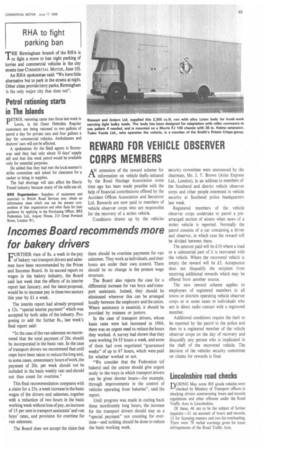Incomes Board recommends more for bakery drivers
Page 47

If you've noticed an error in this article please click here to report it so we can fix it.
UURTHER rises of 8s. a week in the pay
of bakery van transport drivers and salesmen have been recommended by the Prices and Incomes Board. In its second report on wages in the bakery industry, the Board said last week that the effects of its interim report last January, and the latest proposal, would be to increase pay in these two sectors this year by £1 a week.
The interim report had already proposed a 12s. "special interim payment" which was accepted by both sides of the industry. Proposing to add the further 8s., last week's final report said:
"In the case of the van salesmen we recommend that the total payment of 20s. should be incorporated in the basic rate. In the case of transport drivers we recommend that until steps have been taken to reduce the long and, in some cases, unnecessary hours of work,the payment of 20s. per week should not be included in the basic weekly rate and should not thus count for overtime."
This final recommendation compares with a claim for a 25s. a week increase in the basic wages of the drivers and salesmen, together with a reduction of two hours in the basic working week without loss of pay, an increase of 15 per cent in transport assistants' and van boys' rates, and provision for overtime for van salesmen.
The Board does not accept the claim that there should be overtime payments for van salesmen. They work as individuals, and their hours are under their own control. There should be no change in the present wage structure.
The Board also rejects the case for a differential increase for van boys and transport assistants. Indeed, they should be eliminated wherever this can be arranged locally between the employers and the union. Where assistance is essential, it should be provided by trainees or juniors.
In the case of transport drivers, whose basic rates were last increased in 1964, there was an urgent need to reduce the hours they worked. A survey had shown that they were working 54-55 hours a week, and some of them had even negotiated "guaranteed weeks" of up to 67 hours, which were paid for whether worked or not.
"We consider that the Federation (of bakers) and the unions should give urgent study to the ways in which transport drivers can be given shorter hours—for example, through improvements in the control of vehicles operating from bakeries", said the report.
Until progress was made in cutting back these inordinately long hours, the increase for the transport drivers should stay as a "special payment" not counting for overtime—and nothing should be done to reduce the basic working week.




















































































































































